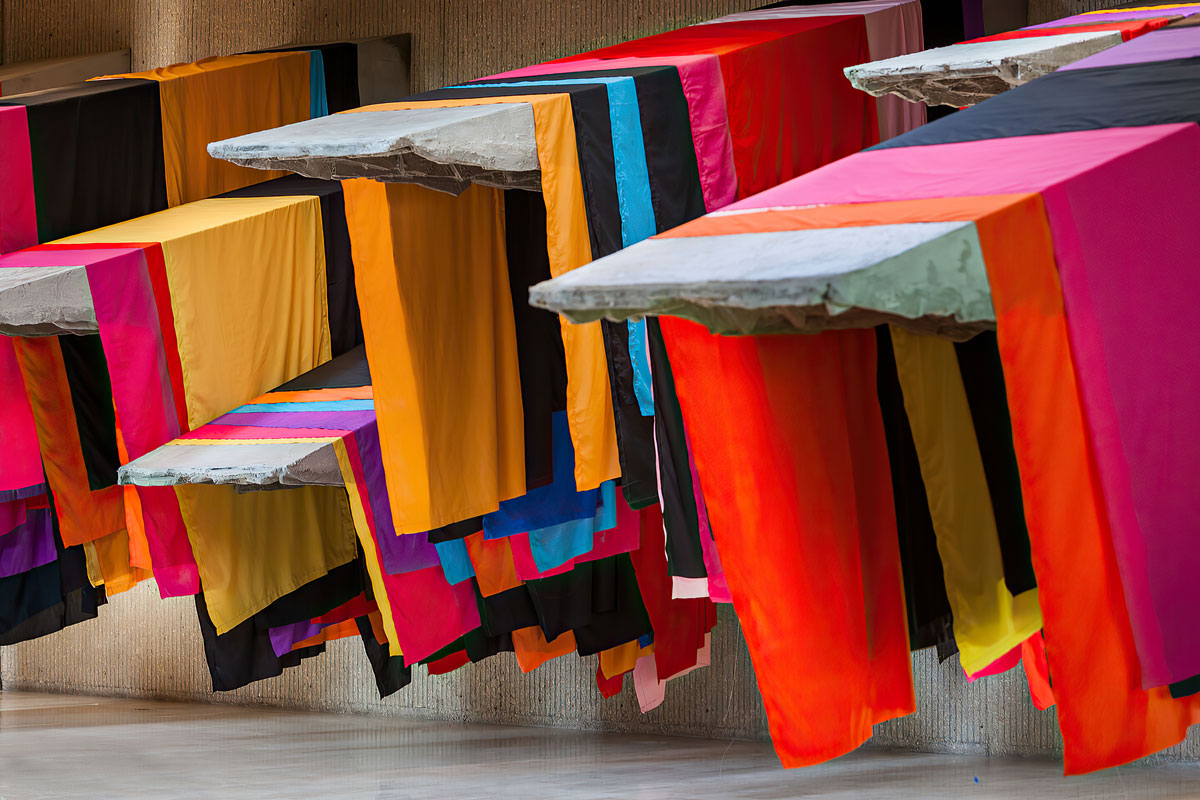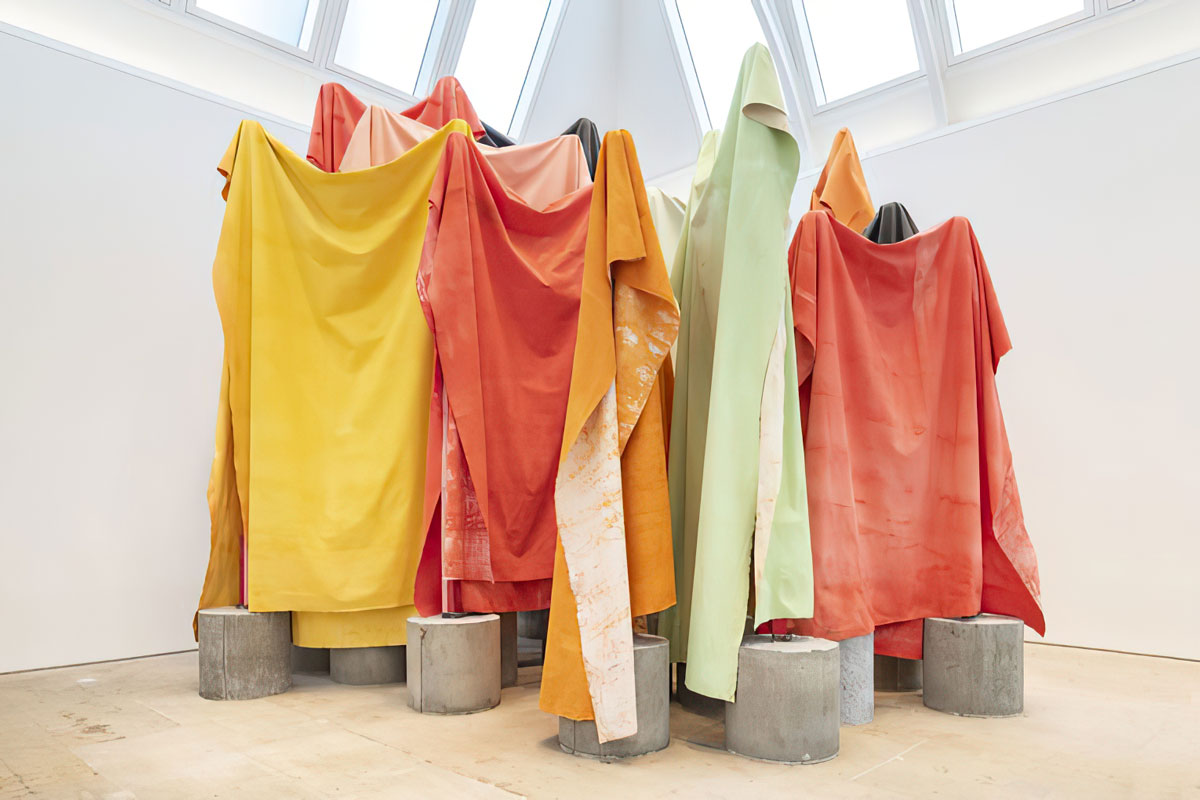ART-PRESENTATION: Phyllida Barlow-Frontier
 Phyllida Barlow deconstructs contemporary sculpture. After her breakout exhibition in 2010, the British artist scrapped her colossal works for parts, recycling their components for new sculptures. This resistance to the perceived permeance of art defines her oeuvre. At once intimidating and childlike, her monumental art, comprised of both industrial and household materials, reflects playfully on our relationship to our natural and human environments.
Phyllida Barlow deconstructs contemporary sculpture. After her breakout exhibition in 2010, the British artist scrapped her colossal works for parts, recycling their components for new sculptures. This resistance to the perceived permeance of art defines her oeuvre. At once intimidating and childlike, her monumental art, comprised of both industrial and household materials, reflects playfully on our relationship to our natural and human environments.
By Efi Michalarou
Photo: Haus der Kunst Archive
With “Frontier”, the major retrospective of the work of Phyllida Barlow, Haus der Kunst opens a series of exhibitions in the museum’s East Wing dedicated to contemporary female voices. Her sculptural structures are unwieldy and difficult to take in: timber, cardboard, cement, clay, plastic pipes, and colorful textiles pile up, spread out, or block the visitors’ way. The view ranges over these landscapes made of everyday materials, unsure what to hold on to, and drifts up to grasp their enormous dimensions. Barlow‘s works pose a constant challenge; they conquer the space as if they led a life of their own. They invite viewers to reconsidering spaces, perceive volume, and hear the language of architecture. Phyllida Barlow studied at Chelsea College of Art (1960–63) and the Slade School of Art (1963–66). After joining the staff in the late 1960s, Barlow taught at the Slade School of Art for more than 40 years before retiring in 2009 and is now Emerita Professor of Fine Art. Barlow’s early work responded to the Modernist sculpture that had emerged in Britain and Europe in the 1950s and early 1960s. As her practice evolved, she took against its weighty formalism and monumentalism, sensing an imposed morality, and gravitated towards Arte Povera in Europe and concurrent sculptural developments in the United States. Barlow continues to explore much of the spirit of these more fragile, but nonetheless confident, formal sculptural statements in her own work. This is evident in the material she employs, the visual language and form of her work and also the environment she creates through her installations. By producing large-scale works and installations from everyday, industrial materials and expedient fabrication processes, Barlow challenges the ideas of monumentality and authority associated with traditional sculptural materials and methods. Space is one of the starting points for Barlow; she refers to it as a ‘protagonist’ of the work she creates to inhabit it. The installation of the works and their relationship both to each other, and to the space they occupy, is crucial to Barlow, who views the placement of the work, and the way in which the visitor will first physically encounter it, as integral to the creative process. Employing media such as plaster, timber, foam and hardboard, Barlow is able to manipulate and reform these materials. Their use, unlike less malleable materials associated with traditional sculpture – bronze, stone and steel – allows her to retain the freedom to make significant changes as the piece develops, unpicking and redoing previous work. After being awarded the Aachener Kunstpreis in 2012, Barlow was commissioned to do a solo exhibition for the Ludwig Forum für Internationale Kunst in Germany. In 2016, Barlow presented a solo exhibition of new work at the Kunsthalle Zurich. Barlow is one of four artists to be nominated for the inaugural Hepworth prize, the UK’s first prize for sculpture. For the 2017 Venice Biennale, Barlow unveiled her powerfully industrial and bulbous “Folly” series, which took over both a sanitised indoor space and the idyllic Venetian outdoors. Barlow initially planned for her installation of 41 ‘baubles’ to be hanging from planks that jutted from facade of the pavilion but this vision had to be altered due to expense; they were ultimately displayed in a way that resembled lollipops.
Photo: Phyllida Barlow, untitled: 11 awnings, 2013, Collection of the artist, London
Info: Curator: Damian Lentini, Assistant Curator: : Lisa Paland, Haus der Kunst, Prinzregentenstrasse 1, Munich, Duration: 3/3-25/7/2021, Days & Hours: Mon, Wed & Sun 10:00-18:00, Thu 10:00-22:00, Fri-Sat 10:00-20:00, https://hausderkunst.de

Center: Phyllida Barlow, untitled: hanginglump, 2, 2012 © Phyllida Barlow, Courtesy the artist and Hauser & Wirth, Photo: Genevieve Hanson
Right: Phyllida Barlow, untitled: hoard (detail), 2013, Installation view, Norton Museum of Art, West Palm Beach FL, 2013 © Phyllida Barlow, Courtesy the artist and Hauser & Wirth Photo: Lila Photo

